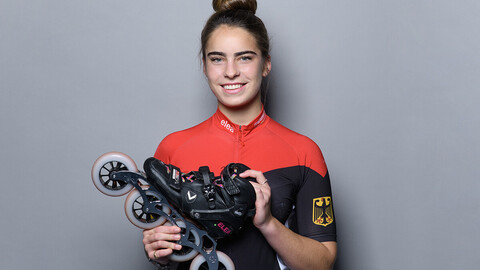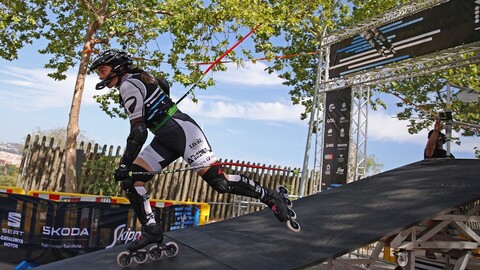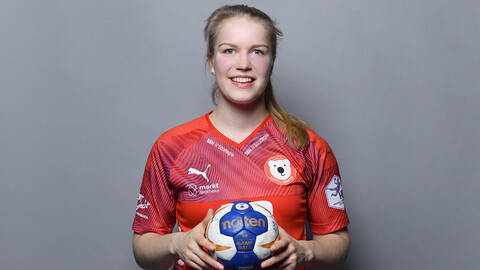Inline Alpin: Elea Börsig
Business administration student Elea Börsig was three years old the first time she put on a pair of inline skates. Today, 21 years later, she competes in inline alpine tournaments worldwide as part of the German national team – and has enjoyed great success, with multiple world champion titles to her name. FORUM spoke to her about a sport that initially sounds rather unusual and how she came to take it up.

Summer 2023 in the city of Tuttlingen in southern Baden-Württemberg. Elea Börsig is standing in her inline skates on a smoothly blacktopped side road with little traffic. In front of her is a ramp with around a 10% gradient and 30 poles secured by heavy, cast-iron base plates that mark out a path through which Börsig must slalom as quickly and with as few technical errors as possible. Her current speed record for this year: 58 km/

She grew up in the Swabian Jura with two older sisters. From watching them, she learned two different sports: In the winter, she would take part in skiing competitions, while in the summer she would practice slalom racing on inline skates. Like her sisters, she quickly became captivated by the thrilling speed and the technical precision demanded by both sports. “Inline alpine was originally summer training for the winter sport. A little under 20 years ago, it became a sport in its own right due to a growing international inline alpine community,” explains Börsig. The ski club in her hometown recognized the growing popularity and opened an inline skating section, which Börsig quickly joined. “I used to do both skiing and inline skating, and took part in competitions in both disciplines.” She almost ended up attending a specialist academy for skiers. “But that would have meant focusing far more on alpine skiing,” she said. She opted against a professional skiing career, and her subsequent success has vindicated that choice. For years, she has been one of the top skaters on the German inline alpine team; last year she was also appointed team spokesperson.
With the team, she travels the world to international competitions in Spain, Latvia, and China. The events usually take place in city centers to raise more awareness of the sport. The world association’s next goal is clear: to apply for Olympic status. Until then, Börsig will continue to split her time between sport and studying. “I was hoping to be accepted by Mannheim, as it has the best overall package: a very good university plus an elite sports scholarship that offers lots of support to help optimally combine sport and university.” Her mandatory semester abroad was also a good fit for her academic and sporting goals: She lived and studied in Nagoya, Japan, and trained with a team in Tokyo. “Then I flew to Spain with the team for four days for the world championship finals. All squeezed into a very short period of time, but it was a great opportunity to earn some important championship points.” Börsig believes she has learned a lot from the combination of top-flight sport and university: “Down the years, I have learned so much in terms of organizational skills, endurance, and teamwork, which I see as a great asset.”
Text: Luisa Gebhardt/
Beach handball: Amelie Möllmann
Beach handball – that sounds difficult, after all, you can't dribble on sand. Running and jumping is also much harder than indoors in the gym. But Amelie Möllmann is not discouraged by that. The 22-year-old studies in the Mannheim Master in Management program and is one of Germany's most successful beach handballers. She told FORUM why she is attracted to this young sport and what she is dreaming of.

Amelie Möllmann uses a two-pronged approach. Like all beach handball players, she learned technical foundations indoors in the gym. At the age of five, she joined club in her hometown near Helmstedt. Today she plays the second national handball league for the “Kurpfalz Bären” team of TSG Ketsch. But her big passion is beach handball, which she tried first at the age of 14. “The first two years were terrible,” she says, laughing. “I was a talent indoors, but nothing worked in the sand.” That's different today: She became German champion in 2021 and won the European and World Championships and the World Games within less than a year as the outside right of the German national beach handball team.
But what distinguishes beach handball from indoor handball? “I like the speed. So much happens on the field in the two halves of 10 minutes each,” says Möllmann. This may be thanks to the smaller field and the smaller number of players: On the sand court, its four play against four. Indoors it is seven against seven. And then there's the artistic aspect: In beach handball, there are two points for a goal when it is scored by a spectacular throw. Möllmann obviously is a master of this art: She scored the most goals at the 2022 World Games. Her enthusiasm for the sport is noticeable with every word. With glowing eyes, she talks about the great places where tournaments take place, the very special mood on the beach and among the participants. However, it is important to her to underline that “beach handball is competitive sport.”
Möllmann's indoor handball club supports her second career on the sand court 100 percent and puts her on leave her for training courses and competitions if necessary. And during the summer, she is free to pursue her passion anyway. In the summer Möllmann takes part in tournaments of the German beach handball series with the Minga Turtles from Ismaning and travels around the world with the national team.
Of course, this double load is sometimes exhausting: “I'm in two teams that I want to support,” says Möllmann. In the summer, she has to train on her own a lot, because the beach handball players are spread all over Germany. Discipline is key. No problem for Möllmann: “I am very ambitious and competitive. That's why I decided to study in Mannheim even before my bachelor's degree. I knew I would be getting an excellent education here and I meet many like-minded people.” She is supported by the Spitzensportstipendium Metropolregion Rhein-Neckar.
If you ask Möllmann what she wishes for the future, she answers without hesitation: “The Olympic Games in Paris – and increase my sports’ profile in Germany!”
Text: Dr. Maartje Koschorreck/
Beach handball at the 2024 Olympic Games
In Paris, beach handball is one of the so-called demonstration sports, meaning it is not (yet) an integral part of the Olympic program. Four men's and four women's teams will compete against each other. Cross-national all-star teams are planned. The International Handball Federation IHF is expected to decide which players are allowed to participate.
